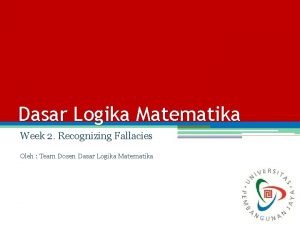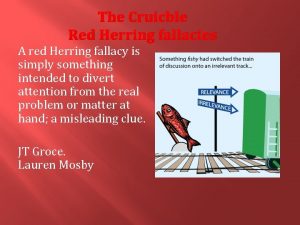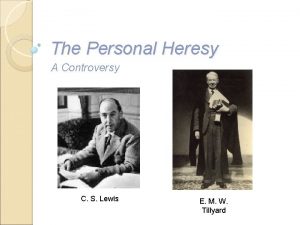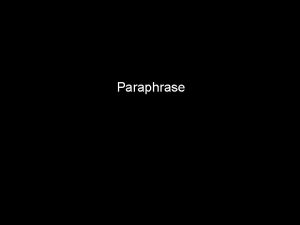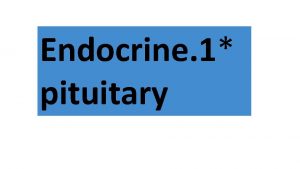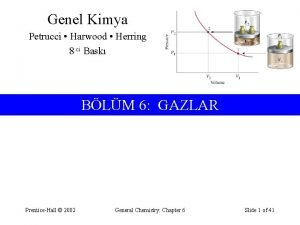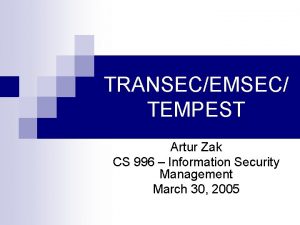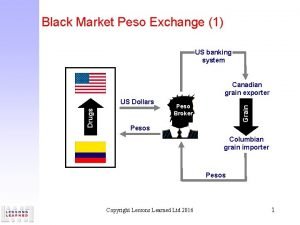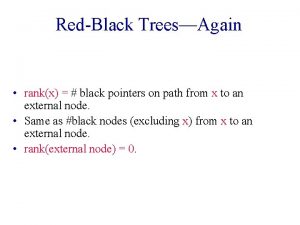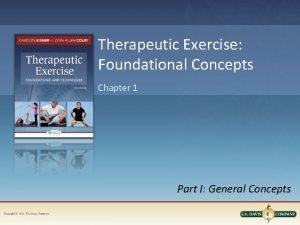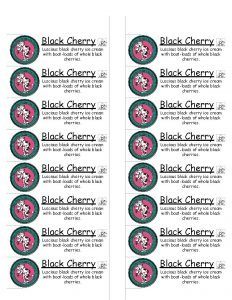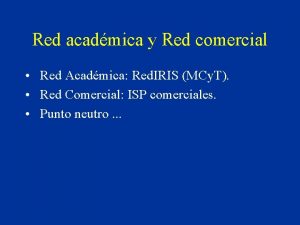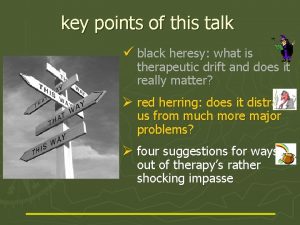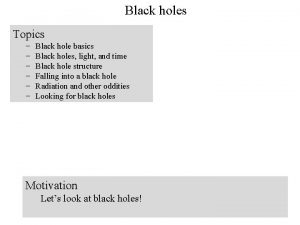therapeutic drift black heresy or red herring Dr

therapeutic drift: black heresy or red herring? Dr James Hawkins www. goodmedicine. org. uk

key points of this talk Ø black heresy: what is therapeutic drift and does it really matter? Ø red herring: does it distract us from much more major problems? Ø four suggestions for ways out of therapy’s rather shocking impasse

what is therapist drift? “Therapist drift occurs when clinicians fail to deliver the optimum evidence-based treatment despite having the necessary tools, and is an important factor in why those therapies are commonly less effective than they should be in routine clinical practice” Waller, G. and H. Turner (2016). "Therapist drift redux: Why well-meaning clinicians fail to deliver evidence-based therapy, & how to get back on track. " Behaviour Research and Therapy 77: 129 -137.

does ‘therapist drift’ matter? “Therapist drift … is an important factor in why … therapies are commonly less effective than they should be in routine clinical practice” Waller & Turner (2016) this claim suggests that: ² high therapist adherence to specific therapy models is strongly linked to good outcome ² high therapist competence in specific therapy techniques is strongly linked to good outcome ² there will be a tendency for outcomes to worsen the longer therapists are in practice

does ‘therapist drift’ matter? adherence, competence & outcome: Webb, C. A. , et al. (2010). "Therapist adherence/competence and treatment outcome: A meta-analytic review. " J Consult Clin Psy 78: 200 -211. “The literature search identified 36 studies … neither the mean weighted adherence-outcome (r =. 02) nor competence-outcome (r =. 07) effect size estimates were found to be significantly different from zero. ”

does ‘therapist drift’ matter? adherence, competence & outcome: Weck, F. , et al. (2015). "Treatment failure in CBT: therapeutic alliance as a precondition for an adherent and competent implementation of techniques. " Br J Clin Psychol 54(1): 91 -108. “higher therapists' competence was found to affect treatment outcome positively, only mediated by therapeutic alliance. Higher … adherence affected treatment outcome positively, only mediated by … competence-alliance. ”

does ‘therapist drift’ matter? adherence, competence & outcome: Tschuschke, V. , et al. (2015). "The role of therapists' treatment adherence, professional experience, therapeutic alliance … treatment outcome in eight different psychotherapy approaches. " Psychother Res 25(4): 420 -434. “There was no statistically significant association between … the degree of therapists' treatment fidelity and the treatment outcome. ”

does ‘therapist drift’ matter? “Therapist drift … is an important factor in why … therapies are commonly less effective than they should be in routine clinical practice” Waller & Turner (2016) this claim suggests that: ² high therapist adherence and competence to specific models are strongly linked to outcome how about the suggestion that: ² there will be a tendency for outcomes to worsen the longer therapists are in practice

effects of increasing experience ² systematic review of 62 studies published between 1966 and 2004 looking at physician experience effects ² 73% found increasing experience associated with decreasing performance for some (21%) or all (52%) outcomes assessed ² there seems to be an inverse relationship between years of experience and the quality of care that is provided Choudhry, N. K. , et al. (2005). "Systematic review: The relationship between clinical experience and quality of health care. " Ann Intern Med 142(4): 260 -273.

effects of increasing experience Researchers examined the association between experience and mortality rates for surgeons performing cardiac artery bypass grafting. After adjust-ment for both patient and doctor variables, they found that surgeons who had been in practice longer had higher operative mortality rates (P<0. 001). Hartz A. J. , et al. (1999). “Prestige of training programs and experience of bypass surgeons as factors in adjusted patient mortality rates. ” Med Care. 37: 93 -103. Mortality rates were analyzed for 39, 007 hospitalized patients with acute myo-cardial infarction managed by 4, 546 cardiologists, internists & family pract-itioners. After controlling for patient’s probability of death, hospital location & practice environment, physician specialty, board certification & the volume of patients seen, the researchers found a 0. 5% increase in mortality for every year since the treating physician had graduated from medical school. Norcini, J. J. , et al. (2000). "Certification and specialization: Do they matter in the outcome of acute myocardial infarction? " Academic Medicine 75(12): 1193 -1198.

effects of increasing experience not so relevant for psychotherapy Goldberg, S. B. , et al. (2016). "Do psychotherapists improve with time and experience? A longitudinal analysis of outcomes. " J Couns Psychol 63: 1 -11. “Therapists (170) achieved outcomes comparable with benchmarks from clinical trials. However, a very small but statistically significant change in outcome was detected indicating that on the whole, therapists' patient prepost d tended to diminish as experience (time mean<5 yr or cases) increases … Further, therapists were shown to vary significantly across time, with some therapists showing improvement despite the overall tendency for outcomes to decline. ” Hill , C. E. and S. Knox (2013). “Training and supervision in psychotherapy” in M. J. Lambert (ed) “Handbook of psychotherapy & behavior change 6 th ed” “Two recent analyses of very large numbers of therapists (652) perhaps provide the most definitive evidence about therapist experience … In summary. . . more recent studies involving large numbers of therapists showing no effects. ”

effects of increasing experience not so relevant for psychotherapy Wampold, B. E. and G. S. Brown (2005). "Estimating variability in outcomes attributable to therapists: a naturalistic study of outcomes in managed care. " J Consult Clin Psychol 73(5): 914 -923. “the authors analyzed the outcomes of 6, 146 patients seen by approximately 581 therapists in the context of managed care … therapist age, gender, experience, and professional degree accounted for little of the variability in outcomes. ” Okiishi, J. C. , M. J. Lambert, et al. (2006). "An analysis of therapist treatment effects: Toward providing feedback to individual therapists on their clients' psychotherapy outcome. " Journal of Clinical Psychology 62(9): 1157 -1172 “data collected on over 5, 000 clients seen by 71 therapists over a 6 year period … client recovery could not be shown to be a function of differences in therapist gender, professional training, professional experience, or theoretical orientation. ”

key points of this talk ü black heresy: what is therapeutic drift and does it really matter? Ø red herring: does it distract us from much more major problems? Ø four suggestions for ways out of therapy’s rather shocking impasse

reasons to be pleased ² 100’s of psychotherapy meta-analyses show effect sizes of approximately 0. 6 (0. 4 to 0. 8) ² in the social sciences, this is a ‘medium’ to ‘strong’ effect size (for Cohen’s d) ² it makes psychotherapy as or more potent than many well established EBM procedures including (for example) almost all intervent-ions in asthma, geriatrics, and cardiology Lambert, M. J. (2013). “The efficacy and effectiveness of psychotherapy” in M. J. Lambert (ed) “Handbook of psychotherapy and behavior change (6 th ed)”

reasons to be pleased ² reductions in relapse rates compared to medication or no treatment – so for depression a meta-analysis by De Maat et al (2006) reported a relapse rate of 27% for psychotherapy but a rate of 57% for pharmacotherapy (if medication was discontinued) ² there is also a growing research literature (Smith & Williams, 2013) highlighting reductions in medical & psychological treatment costs and reductions in time off work achievable with psychological interventions De Maat, S. , et al. (2006). "Relative efficacy of psychotherapy and pharmacotherapy in the treatment of depression: A meta-analysis. " Psychotherapy Research 16(5): 566 -578 Smith, T. W. & P. Williams (2013). “Behavioral medicine and clinical health psychology. ” in M. J. Lambert (ed) “Handbook of psychotherapy and behavior change (6 th ed)”

reasons to be pleased disappointed ² 100’s of psychotherapy meta-analyses show effect sizes of approximately 0. 6 (0. 4 to 0. 8) ² but since Smith, Glass & Miller’s estimate of an 0. 85 effect size from a meta-analysis of 475 studies in 1980, there has been no general effectiveness increase over the next 35 years ² in fact improved statistical methods suggest we have been over-estimating effectiveness Lambert, M. J. (2013). “The efficacy and effectiveness of psychotherapy” in M. J. Lambert (ed) “Handbook of psychotherapy and behavior change (6 th ed)”

concerns about how well we help those struggling with depression ² dodo bird: no large differences in efficacy between seven different approaches (Cuijpers et al, 2008) ² research quality for third wave therapies such as ACT, DBT, etc somewhat poor (Ost, 2014) ² publication bias seems to have considerably over-estimated effect sizes (Cuijpers et al, 2010) Cuijpers, P. , et al. (2008). "Psychotherapy for depression in adults: A meta-analysis of comparative outcome studies. " J Consult Clin Psychol 76(6): 909 -922. Öst, L. -G. (2014). "The efficacy of Acceptance and Commitment Therapy: An updated systematic review and meta-analysis. " Behav Res and Therapy 61(10): 105 -121. Cuijpers, P. , et al. (2010). "Efficacy of CBT & other psychological treatments for adult depression: Meta-analytic study of publication bias. " Br J Psychiatry 196: 173 -178.

. . . & those struggling with anxiety “Psychological therapies, in general, have been found to be highly effective for anxietybased problems. The family of cognitive and behavior therapies have been studied most often and extensively … “ (Lambert, 2013) “Cognitive-behavior therapies (CBT) have been evaluated in randomized controlled studies (RCT) and anxiety disorders since 1966 … (No meta-analysis) … has looked at whether modern CBT studies lead to better treat-ment effects than were obtained 1040 years ago. The aim of this paper is to present a meta-analysis focusing on the mean extent of change achieved by the CBT treatments across decades (from the 1970 s onwards) … The results showed that in most instances there was no significant change in ES (effect size) across time … If the single studies that gave the highest ES each decade were compared, all anxiety disorders besides panic disorder and obsessive -compulsive disorder showed a positive development. ” (Ost, 2008) Lambert, M. J. (2013). “The efficacy and effectiveness of psychotherapy” in M. J. Lambert (ed) “Handbook of psychotherapy and behavior change (6 th ed)” Ost, L. G. (2008). "Cognitive behavior therapy for anxiety disorders: 40 years of progress. " Nord J Psychiatry 62 Suppl 47: 5 -10.

& more concerns with depression effect sizes achieved by CBT treatment for depression over the last 40 years Ø have effect sizes changed over the years? Ø if so, what are the causes? study quality? depression severity? comorbidity? use of manual? therapist training/experience? Johnsen, T. J. and O. Friborg (2015). "The effects of cognitive behavioral therapy as an antidepressive treatment is falling: a meta-analysis. " Psychol Bull. 141(4): 747 -768 https: //uit. no/Content/418448/The%20 effect%20 of%20 CBT%20 is% 20 falling. pdf

& more concerns with depression

key points of this talk ü black heresy: what is therapeutic drift and does it really matter? ü red herring: does it distract us from much more major problems? Ø four suggestions for ways out of therapy’s rather shocking impasse

four suggestions for ways out of our impasse ² identification and study of highly successful therapists’ methods and characteristics ² routine outcome monitoring to encourage alerts and problem-solving if one is going off track ² teaching & specific training in ‘facilitative interpersonal skills’ ² lessons from emerging research on how people develop excellence

a focus only on therapy differences misses other crucial sources of help Mulla Nasrudin and the lost keys

increasingly research shows major differences between therapists Brown, G. S. and E. R. Jones (2005). "Implementation of a feedback system in a managed care environment: What are patients teaching us? " Journal of Clinical Psychology 61(2): 187 -198. Okiishi, J. C. , M. J. Lambert, et al. (2006). "An analysis of therapist treatment effects: Toward providing feedback to individual therapists on their clients' psychotherapy outcome. " Journal of Clinical Psychology 62(9): 1157 -1172 Lutz, W. , S. C. Leon, et al. (2007). "Therapist effects in outpatient psychotherapy: A three-level growth curve approach. " Journal of Counseling Psychology 54: 32 -39. Anderson, T. , B. M. Ogles, et al. (2009). "Therapist effects: Facilitative interpersonal skills as a predictor of therapist success. " J Clinical Psychology 65: 755 -768. Kraus, D. R. , L. Castonguay, et al. (2011). "Therapist effectiveness: Implications for accountability and patient care. " Psychotherapy Research 21(3): 267 -276. Saxon, D. and M. Barkham (2012). "Patterns of therapist variability: Therapist effects & the contribution of patient severity and risk. " J Consult Clin Psychol 80(4): 535 -546. Baldwin, S. A. & Imel, Z. E. (2013). “Therapist effects: Findings and methods” in M. J. Lambert (ed) “Handbook of psychotherapy and behavior change (6 th ed )”

therapist effects Saxon, D. & M. Barkham (2012). "Patterns of therapist variability: Therapist effects & the contribution of patient severity and risk. " J Consult Clin Psychol 80(4): 535 -546.

differences in recovery rates research in UK NHS adult primary care counseling & psychological therapy services recovery rates ² study of 119 therapists treating 10, 786 patients ² recovery used the standard Jacobson & Truax criteria: reliable change to below the clinical cut-off ² three groups of therapists found, comprising 19 poor (16%), 79 average (66%), and 21 excellent (18%) Saxon, D. & M. Barkham (2012). "Patterns of therapist variability: Therapist effects & the contribution of patient severity and risk. " J Consult Clin Psychol 80(4): 535 -546.

why therapist effects differences? research suggests that differences in therapist effectiveness are NOT due to: type of therapy being used therapist qualifications/training duration of therapist experience therapist age therapist gender Baldwin, S. A. and Z. E. Imel (2013). “Therapist effects: findings and methods” in M. J. Lambert (ed) “Handbook of psychotherapy and behavior change (6 th ed)”

self-assessment isn’t accurate ² multidisciplinary sample of mental health professionals ² compare their own overall clinical skills & performance to others in their profession ² 25% assessed themselves to be in the top 10% of skills & performance & none viewed themselves as below average assessment Walfish, S. , B. Mc. Alister, et al. (2012). "An investigation of self-assessment bias in mental health providers. " Psychol Rep 110(2): 639 -644. Davis, D. , et al. (2006). "Accuracy of physician self-assessment compared with observed measures of competence: A systematic review. " JAMA 296: 1094 -1102

therapist effects: tentative findings ² the difference in outcome between better & worse therapists stands out most with more complex, challenging patients (Saxon & Barkham, 2012). ² more effective therapists seem to be more resilient & mindful than less effective therapists (Pereira, 2015) ² it seems that “facilitative interpersonal skills” demon-strated specifically in difficult interpersonal situations are of particular importance (Anderson, 2009/15/16) ² more effective therapists’ better interpersonal skills also tend to become evident in general discussions & seem predictive of future results (Schottke, 2016) ² sessional outcome/alliance monitoring seems helpful especially for less effective therapists (Anker, 2009)

four suggestions for ways out of our impasse ü identification and study of highly successful therapists’ methods and characteristics ² routine outcome monitoring to encourage alerts and problem-solving if one is going off track ² teaching & specific training in ‘facilitative interpersonal skills’ ² lessons from emerging research on how people develop excellence

practice-based evidence “At its heart, practice-based evidence is premised on the adoption and ownership of a bona fide measurement system and its implementation as standard procedure within routine practice. ” ² celesthealth system for mental health & college counseling settings (chs-mh) www. celesthealth. com ² clinical outcomes in routine evaluation (core) www. coreims. co. uk ² outcome questionnaire-45 (oq 45) & linked measures www. oqmeasures. com ² partners for change outcome management system (pcoms) http: //scottdmiller. com & https: //heartandsoulofchange. com ² treatment outcome package (top) www. outcomereferrals. com Castonguay, L. , M. Barkham, W. Lutz, et al. (2013). “Practice-orientated research. ” in M. J. Lambert (ed) “Handbook of psychotherapy and behavior change (6 th ed)”

helping improve outcomes … especially when non-response risk “ … repeated assessment and immediate feed-back of a patient’s mental health functioning during the course of therapy can alert therapists to patient non-response or negative response, support decisions on treatment planning and strategies (e. g. when and how to repair thera-peutic alliance ruptures) and help determine when treatment has been sufficient. ” Castonguay, L. , M. Barkham, W. Lutz, et al. (2013). “Practice-orientated research. ” in M. J. Lambert (ed) “Handbook of psychotherapy and behavior change (6 th ed)”

bad at identifying deterioration ² 550 clients & 48 therapists (22 licensed, 26 trainees) ² told that 8% of clients would probably deteriorate & they were asked to identify them ² 40/550 (7. 3%) of clients actually deteriorated (OQ-45) ² actuarial feedback identified 36/40 – a 90% detection rate ² therapists identified 3, only 1 of whom actually deteriorated – a 2. 5% detection rate ² it was a trainee who was the only one who was accurate Hannan, C. , M. J. Lambert, et al. (2005). "A lab test and algorithms for identifying clients at risk for treatment failure. " Journal of Clinical Psychology 61(2): 155 -163.

using regular sessional feedback helps therapists improve outcomes M. Barkham, G. E. Hardy & J. Mellor-Clark (ed’s) (2010) “Developing and delivering practicebased evidence. ” Chichester: John Wiley & Sons. Newnham, E. A. and A. C. Page (2010). "Bridging the gap between best evidence and best practice in mental health. " Clin Psychol Rev 30(1): 127 -142. Shimokawa, K. , M. J. Lambert, et al. (2010). "Enhancing treatment outcome of patients at risk of treatment failure: Meta-analytic and mega-analytic review of a psychotherapy quality assurance system. " J Consult Clin Psychol 78(3): 298 -311. Lambert, M. J. (2010) "Prevention of treatment failure: the use of measuring, monitoring, and feedback in clinical practice". Washington: Am Psych Association Lutz, W. , J. R. Bohnke, et al. (2011). "Lending an ear to feedback systems: Evaluation of recovery and non-response in psychotherapy in a German outpatient setting. " Community Ment Health J 47(3): 311 -317. Whipple, J. L. and M. J. Lambert (2011). "Outcome measures for practice. " Annual review of clinical psychology 7: 87 -111. Carlier, I. V. , D. Meuldijk, et al. (2012). "Routine outcome monitoring & feedback on physical or mental health status: Evidence and theory. " J Eval Clin Pract 18: 104 -110.

to get best results from feedback ² best results typically depend on therapists involved being committed to using feedback ² regular sessional assessment of outcome progress & therapeutic alliance given to both therapist & client for possible discussion ² current evidence suggests this halves client deterioration rates ² there are encouraging increases in treatment gains as well - e. g. using pcoms, reliable improve-ment rates increase by 3. 5 x Castonguay, L. , M. Barkham, W. Lutz, et al. (2013). “Practice-orientated research. ” in M. J. Lambert (ed) “Handbook of psychotherapy and behavior change (6 th ed)”

although caution & further evolution of the ideas is needed Kendrick, T. , et al. (2016). "Routine use of patient reported outcome measures (PROMs) for improving treatment of common mental health disorders in adults. " Cochrane Database of Systematic Reviews 7: 1 -106. Davidson, K. , et al. (2015). "Would continuous feedback of patient's clinical outcomes to practitioners improve NHS psychological therapy services? " Psychology and Psychotherapy: Theory, Research and Practice 88(1): 21 -37. Guo, T. , et al. (2015). "Measurement-Based Care Versus Standard Care for Major Depression: A Randomized Controlled Trial. " Am J Psychiatry 172(10): 1004 -1013. Connolly Gibbons, M. B. , et al. (2015). "The effectiveness of clinician feedback in the treatment of depression in the community mental health system. " J Consult Clin Psychol 83(4): 748 -759. Slone, N. C. , et al. (2015). "Evaluating the efficacy of client feedback in group psychotherapy. " Group Dynamics: Theory, Research, and Practice 19(2): 122 -136. Lutz, W. , et al. (2015). "Feedback and therapist effects in the context of treatment outcome and treatment length. " Psychother Res 25(6): 647 -660. Boswell, J. F. , et al. (2015). "Implementing routine outcome monitoring in clinical practice: Benefits, challenges, & solutions. " Psychotherapy Research 25(1): 6 -19.

four suggestions for ways out of our impasse ü identification and study of highly successful therapists’ methods and characteristics ü routine outcome monitoring to encourage alerts and problem-solving if one is going off track ² teaching & specific training in ‘facilitative interpersonal skills’ ² lessons from emerging research on how people develop excellence

facilitative interpersonal skills (fis) Ø there is evidence that differences between poor, Ø Ø Ø good & excellent therapists become more obvious when working with more complex, challenging clients when assessing expertise in other disciplines … for example airline pilots. . . assessments often involve videoing pilot responses to simulated plane crises assessing therapist responses to simulated ‘crises’ with challenging clients therefore has considerable face validity there are intriguing implications for the use of recorded, assessed, problem-solved & then repeated interactions with acted out therapistclient challenges

facilitative interpersonal skills This study examined sources of therapist effects in a sample of 25 therapists who saw 1, 141 clients at a university counsel-ing center … Therapists' facilitative inter-personal skills (FIS) were assessed with a performance task that measures therapists' interpersonal skills by rating therapist responses to video simulations of challenging client–therapist interactions … only FIS accounted for variance in out-comes suggesting that a portion of the variance in outcome between therapists is due to their ability to handle interperson-ally challenging encounters with clients. Anderson, T. , B. M. Ogles, et al. (2009). "Therapist effects: Facilitative interpersonal skills as a predictor of therapist success. " J Clin Psychol 65: 755 -68

fis assessment & scoring Ø 7 brief (1 -2 min) video clips of challenging situations Ø the clips cover a variety of difficult client interactions – both friendly/hostile and dominant/submissive Ø therapist watches and then immediately records their response to what the client has been saying Ø this response is then scored on (currently) eight scales to give an overall FIS score

fis assessment & scoring the eight criteria are: 1. verbal fluency 2. hope and positive expectations 3. persuasiveness 4. emotional expression 5. warmth, acceptance and understanding 6. empathy 7. alliance bond capacity 8. alliance rupture-repair responsiveness

facilitative interpersonal skills Anderson, T. , B. M. Ogles, et al. (2009). "Therapist effects: Facilitative interpersonal skills as a predictor of therapist success. " J Clinical Psychology 65: 755 -768 Anderson, T. , et al. (2016). "A prospective study of therapist facilitative interpersonal skills as a predictor of treatment outcome. " J Consult Clin Psychol 84(1): 57 -66 Anderson, T. , et al. (2016). "Therapist facilitative interpersonal skills and training status: A randomized clinical trial on alliance and outcome. " Psychother Res 26(5): 511 -29 Schöttke, H. , et al. (2016). "Predicting psychotherapy outcome based on therapist interpersonal skills: A five-year longitudinal study of a therapist assessment protocol. " Psychother Res. Published online 6 Jan

emerging fis-related research Anderson, T. , B. M. Ogles, et al. (2009). "Therapist effects: Facilitative interpersonal skills as a predictor of therapist success" J Clin Psychol 65: 755 -68 ”This study examined sources of therapist effects in a sample of 25 therapists who saw 1, 141 clients at a university counseling … (from a wide variety of therapist characteristics – therapeutic orientation qualifications, etc) only FIS accounted for variance in outcomes” Anderson, T. , et al. (2016). "A prospective study of therapist facilitative interpersonal skills as a predictor of treatment outcome. " JCCP 84: 57 -66 “ … examined whetherapists’ (44 clin psychology Ph. D students) facilitative interpersonal skills (FIS) would prospectively predict the outcomes of therapies that occurred more than one year later (when they began work as trainees in the department’s training clinic) … therapist FIS significantly predicted client symptom change … higher FIS therapists were more effective than lower FIS therapists”

emerging fis-related research Anderson, T. , et al. (2016). "Therapist FIS and training status: A randomized clinical trial on alliance and outcome. " Psychother Res 26(5): 511 -529, ”tested the efficacy of therapists who were selected by their facilitative interpersonal skills (FIS) and training status (11 with at least 2 years of clinical psychology training & 12 from various other university subjects with no psychotherapy training) … Outcome and alliance differences for training status were negligible. High FIS therapists had greater pre–post client outcome, and higher rates of change across sessions, than low FIS therapists. ” Schöttke, H. , et al. (2016). "Predicting psychotherapy outcome based on therapist interpersonal skills: A five-year longitudinal study of a therapist assessment protocol. " Psychother Res. Published online 6 th Jan “ … trainees' with more positively rated interpersonal behaviors assessed in the observer-rated group format … showed superior outcomes over the fiveyear period. This effect remained controlling for therapist characteristics (gender, theoretical orientation [cognitive behavioral or psychodynamic], amount of supervision … ), and patient characteristics (age, gender, number of comorbid diagnoses, global severity, and personality disorder diagnosis).

trib assessment & scoring Ø groups of 6 -12 participants Ø shown a ‘provocative 15 min film clip’ (which included a demonstration of a therap-eutic intervention that was not part of the training offered at the institute Ø participants were asked to monitor their feelings & thoughts during the clip & discuss them afterwards Ø therapist interpersonal behaviours (TRIB) were observed and rated

trib assessment & scoring the nine behaviours are: 1 -2. clear & positive communication (2 items) 3 -4. empathy & positive attunement (2 items) 5. respect & warmth 6 -8. managing criticism (3 items) 9. willingness to cooperate

four suggestions for ways out of our impasse ü identification and study of highly successful therapists’ methods and characteristics ü routine outcome monitoring to encourage alerts and problem-solving if one is going off track ü teaching & specific training in ‘facilitative interpersonal skills’ ² lessons from emerging research on how people develop excellence

ericsson & achieving excellence Ericsson, K. A. (2013) “The science of excellence meets psychotherapy. ” lecture at “Achieving clinical excellence. ” conference. May 17 th, Amsterdam. Ericsson, K. A. , K. Nandagopal, et al. (2009). "Toward a science of exceptional achievement: Attaining superior performance through deliberate practice. " Ann N Y Acad Sci 1172: 199 -217. Ericsson, K. A. (2008). "Deliberate practice and acquisition of expert performance: A general overview. " Acad Emerg Med 15(11): 988 -994. Ericsson, K. A. , J. t. Whyte, et al. (2007). "Expert performance in nursing: Reviewing research on expertise in nursing within the framework of the expert-performance approach. “ ANS Adv Nurs Sci 30(1): E 58 -71. Ericsson, K. A. , M. J. Prietula, et al. (2007). "The making of an expert. " Harv Bus Rev 85(7 -8): 114 -121, 193. Ericsson, K. A. (2007). "An expert-performance perspective of research on medical expertise: The study of clinical performance. " Med Educ 41(12): 1124 -1130. Ericsson, K. A. (2004). "Deliberate practice & the acquisition & maintenance of expert performance in medicine & related domains. " Acad Med 79(10 Suppl): S 70 -81. Ericsson, K. A. , Krampe, R. T. & Tesch-Romer, C. (1993). “The role of deliberate practice in the acquisition of expert performance. " Psychol Review 100(3): 363 -406.

growing numbers of relevant books K. A. Ericsson (ed. ) (2009) “Development of professional expertise: Toward measurement of expert performance and design of optimal learning environ-ments. ” Cambridge, England: Cambridge University Press. K. A. Ericsson, et al. (ed) (2006). "The Cambridge handbook of expertise and expert performance. ” Cambridge, England: Cambridge University Press. K. A. Ericsson (ed. ) (1996) “The road to excellence: The acquisition of expert performance in the arts and sciences, sports, and games. ” New Jersey: Erlbaum Lemov, D. , Woolway, E. & Yezzi, K. (2012) “Practice perfect: 42 rules for getting better at getting better. ” San Francisco: Jossey-Bass. Ankerson, R. (2012) “The gold mine effect. ” London: Icon Books. Shenk, D. (2010) “The genius in all of us. ” London: Icon Books. Syed, M. (2010) “Bounce: The myth of talent and the power of practice. ” London: Fourth Estate. Coyle, D. (2009) “The talent code. ” New York: Bantam. Gladwell, M. (2008) “Outliers. " Little, Brown and Company. Colvin, G. (2008) “Talent is overrated: What really separates world-class performers from everybody else. ” New York: Penguin. Dweck, C. (2006) “Mindset: How you can fulfil your potential. ” NY: Ballantine. Syed, M. (2015) “Black box thinking: Marginal gains & secrets of high performance”

true expertise & deliberate practice “Traditionally, professional expertise has been judged by length of experience, reputation, and perceived mastery of knowledge and skill. Unfortunately, recent research demonstrates only a weak relationship between these indicators of expertise and actual, observed performance … Expert performance can, however, be traced to active engagement in deliberate practice (DP), where training (often designed and arranged by their teachers and coaches) is focused on improving particular tasks. DP also involves the provision of immediate feedback, time for problem-solving and evaluation, and opportunities for repeated performance to refine behavior. ” Ericsson, K. A. (2008). "Deliberate practice and acquisition of expert performance: A general overview. " Acad Emerg Med 15(11): 988 -994.

deliberate practice requires rapid feedback to refine performance “Deliberate Practice also involves the provision of immediate feedback, time for problem-solving and evaluation, and opportunities for repeated performance to refine behavior. ”

experience & variety of outcomes Ericsson K. Anders. (2013). "The science of human excellence meets psychotherapy. ” lecture at “Achieving clinical excellence conference. ” May 17 th, Amsterdam.

chess players/deliberate practice ² it was time spent in “serious analysis of chess positions on one’s own” that was found to build expert performance (e. g. predicting key moves in games involving chess masters). ² “active participation in chess tournaments” was unrelated to improvement, and “playing chess games outside chess tournaments” was a negative predictor of improvement. ² the increased availability of chess computer programmes has been associated with a reduction in the time taken to become a grandmaster from about 10 years to 5 – 6 years. ² there has also been the emergence of world class players from small countries (with little significant chess history) such as Norway (Magnus Carlsen). Charness, N. , et al. (1996). “The role of practice and coaching in entrepreneurial skill domains: An international comparison of life-span chess skill acquisition. ” in K. A. Ericsson (ed. ) “The road to excellence. ” (51 -80). Hillsdale, NJ: Lawrence Erlbaum.

chess players/deliberate practice Charness, N. , et al. (1996). “The role of practice and coaching in entrepreneurial skill domains: An international comparison of life-span chess skill acquisition. ” in K. A. Ericsson (ed. ) “The road to excellence. ” (51 -80). Hillsdale, NJ: Lawrence Erlbaum.

musicians & deliberate practice classic early study on 20 yr old violin students at the renowned Music Academy of West Berlin ² painstaking series of interviews ² students sorted into 3 groups by professors’ assessments and success in open competitions ² groups indistinguishable by average of starting violin (age 8), average at which decided to become musicians (just before age 15), number of teachers, etc. ² what stood out dramatically were the differences in hours spent practising – with no exceptions! Ericsson, K. A. , Krampe, R. T. & Tesch-Romer, C. (1993). “The role of deliberate practice in the acquisition of expert performance. " Psychol Review 100(3): 363 -406.

maintaining expertise "If I don't practice one day, I know it; two days, the critics know it; three days, the public knows it. “ Jascha Heifetz Krampe, R. T. and K. A. Ericsson (1996). "Maintaining excellence: Deliberate practice and elite performance in young and older pianists. " J Exp Psychol Gen 125(4): 331 -359. Two studies investigated the role of deliberate practice in the maintenance of cognitive-motor skills in expert and accomplished amateur pianists. Older expert and amateur pianists showed the normal pattern of large age-related reductions in standard measures of general processing speed. Performance on music-related tasks showed similar age-graded decline for amateur pianists but not for expert pianists, whose average performance level was only slightly below that of young expert pianists. The degree of maintenance of relevant pianistic skills for older expert pianists was predicted by the amount of deliberate practice during later adulthood. The role of delib-erate practice in the active maintenance of superior domain-specific performance in spite of general age-related decline is discussed.

experience & variety of outcomes Ericsson K. Anders. (2013). "The science of human excellence meets psychotherapy. ” lecture at “Achieving clinical excellence conference. ” May 17 th, Amsterdam.

psychotherapy/deliberate practice ² 17 therapists & 1, 632 clients were studied – therapists were classified into four quartiles depending on their effectiveness. ² as expected – qualifications, profession, experience, age, and gender were found to be unrelated to effectiveness. ² fascinatingly, when asked about their use of client feedback, more successful therapists were much more likely to report being “surprised” by it – possibly a measure both of how well they had “set up” the feedback & of their openness/receptivity ² also significant was their answer to the question: “How many hours per week (on average) do you spend alone seriously engaging in activities related to improving your therapy skills in the current year? ” – the quartiles answered on average 7. 39 (1 st quartile); 4. 13 (2 nd); 2. 00 (3 rd) & 0. 50 hours (4 th quartile). Chow, D. L. , et al. (2015). "The role of deliberate practice in the development of highly effective psychotherapists. " Psychotherapy (Chic) 52(3): 337 -345.

psychotherapy/deliberate practice “solitary activities” included ”reviewing therapy recordings alone, reviewing difficult/challenging cases alone, mentally running through & reflecting on past sessions in one’s mind, mentally running through & reflecting on what to do in future sessions, writing down reflections of past sessions, writing down plans for future sessions, viewing master therapist videos with the aim of developing specific therapeutic skills as a therapist, reading case examples (e. g. narratives, transcripts, case studies), reading of journals pertaining to psychotherapy & counselling, reading/re-reading of core counselling & therapeutic skills in psychotherapy. ” Chow, D. L. , et al. (2015). "The role of deliberate practice in the development of highly effective psychotherapists. " Psychotherapy (Chic) 52(3): 337 -345.

psychotherapy/deliberate practice cumulative time spent in solitary practice over the first eight years of work as a psychotherapist

design & sequencing of training ideally one monitors current performance & then designs specific individualized training activities: there is relevance here both for psychotherapists & clients. Ericsson K. Anders. (2013). "The science of human excellence meets psychotherapy. ” lecture at “Achieving clinical excellence conference. ” May 17 th, Amsterdam.

designing optimal level of practice Ericsson K. Anders. (2013). "The science of human excellence meets psychotherapy. ” lecture at “Achieving clinical excellence conference. ” May 17 th, Amsterdam.

developing expertise research ü clarify overall starting point and overall goal – an obvious example is an aim to improve the proportion of clients who get to “recovery”. ü choose an important sub-goal that will be a good building block in reaching the overall goal. ü again clarify one’s starting point and what the targeted sub-goal end state will look like. ü deliberate practice of sub-goal building block ü fast, accurate feedback, the challenge repeated many times, gradual incremental progress ü select further building block sub-goals to work on ü monitor progress to main over-arching goal ü … badminton example!

where should therapists focus? common factors quality relationship, good goal agreement, confidence in methods specific factors appropriate evidence based therapy, skilfully executed & supervised Both camps can potentially make considerable gains in the results they achieve through better understanding and application of research on how individuals develop expertise – careful, measured assessment of one’s base-line; identification of key areas to work on; clarity about what better performance will look like; repeated, focused practice with rapid feedback; monitoring of whether performance improves & skilled supervision/mentoring

14 qualities of effective therapists 1. A sophisticated set of interpersonal skills including fluency, perceptiveness, modulation/expressiveness, warmth/acceptance, empathy, & focus on the other 2. Clients feel understood, trust therapist & believe therapist can help them 3. Able to form a working alliance with broad range of clients 4. Provide an acceptable and adaptive explanation for the client’s distress 5. Provide a treatment plan that is consistent with the explanation provided to the client 6. Is influential, persuasive, and convincing 7. Continually monitors client progress in an authentic way Wampold, B. E. (2011). ”Qualities and actions of effective therapists. ” APA Education Directorate: Online Article CE Series pp. 1 -7

14 qualities of effective therapists 8. Flexible & will adjust therapy if resistance to the treatment is apparent or the client is not making adequate progress 9. Does not avoid difficult material in therapy and uses such difficulties therapeutically 10. The effective therapist communicates hope and optimism 11. Aware of the client’s characteristics and context 12. Aware of his or her own psychological process 13. The effective therapist is aware of the best research evidence related to the particular client in terms of treatment, problems, social context, and so forth 14. The effective therapist, by definition … achieves expected or more than expected progress with his or her clients, generally, and who is continually improving Wampold, B. E. (2011). ”Qualities and actions of effective therapists. ” APA Education Directorate: Online Article CE Series pp. 1 -7

four suggestions for ways out of our impasse ü identification and study of highly successful therapists’ methods and characteristics ü routine outcome monitoring to encourage alerts and problem-solving if one is going off track ü teaching & specific training in ‘facilitative interpersonal skills’ ü lessons from emerging research on how people develop excellence

key points of this talk ü black heresy: what is therapeutic drift and does it really matter? ü red herring: does it distract us from much more major problems? ü four suggestions for ways out of therapy’s rather shocking impasse

revolution not just evolution the implications of a large & growing body of research are huge for the whole field of psychotherapy: Ø initial selection Ø education & training Ø outcome monitoring Ø supervision & cpd
- Slides: 69










